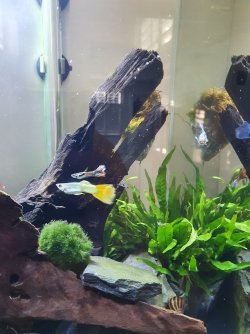Seems since joining this Forum I've had plenty to ask....and today is no exception
So many of you guys have already spoken to me and given plenty of solid, sound advice (Thank you)
So today's topic is my Yellow Guppy Uhtred
I've had him two weeks and to be honest I've always been suspicious he wasnt in the best of health and the other guppies seem to bully him (especially my boy blue, he doesn't stop trying to nip at his underside fins) now I noticed yesterday he has started to get stringy poops. Not white like some people have already discussed all over the place, just long and thin. Sometimes they trail right back to his tail. I also noticed he started hiding in one of the caves I made, which is very unlike guppy behaviour I've come to know. As I speak Uthred has just eaten fine and is currently "hanging out" with the rest of his crew and there is no fighting going on. Obviously I'm worried he is carrying a parasite, which in turn could infect my other fish, including my bottom dwelling Corydora Habrosus. I'm terrified of putting any meds in because of both the Shrimp and Cory's, plus I have no idea what I'm treating. I will try to post a poo pic if I see it, at mo all seems well. I notice his belly is slightly more full looking than the others, but that's hard to judge because I only have one other fully grown adult (others are juveniles)
I'm ready to go to pets at home and buy a small 10 litre quarantine tank and then treat him, or could I just picked up a grandpa? I'm not convinced my local aquatics centre treat there fish brilliantly, but then fish is business to them
Any help as
 always would be appreciated
always would be appreciated
So many of you guys have already spoken to me and given plenty of solid, sound advice (Thank you)
So today's topic is my Yellow Guppy Uhtred
I've had him two weeks and to be honest I've always been suspicious he wasnt in the best of health and the other guppies seem to bully him (especially my boy blue, he doesn't stop trying to nip at his underside fins) now I noticed yesterday he has started to get stringy poops. Not white like some people have already discussed all over the place, just long and thin. Sometimes they trail right back to his tail. I also noticed he started hiding in one of the caves I made, which is very unlike guppy behaviour I've come to know. As I speak Uthred has just eaten fine and is currently "hanging out" with the rest of his crew and there is no fighting going on. Obviously I'm worried he is carrying a parasite, which in turn could infect my other fish, including my bottom dwelling Corydora Habrosus. I'm terrified of putting any meds in because of both the Shrimp and Cory's, plus I have no idea what I'm treating. I will try to post a poo pic if I see it, at mo all seems well. I notice his belly is slightly more full looking than the others, but that's hard to judge because I only have one other fully grown adult (others are juveniles)
I'm ready to go to pets at home and buy a small 10 litre quarantine tank and then treat him, or could I just picked up a grandpa? I'm not convinced my local aquatics centre treat there fish brilliantly, but then fish is business to them
Any help as






 They'll eat my fingers too
They'll eat my fingers too